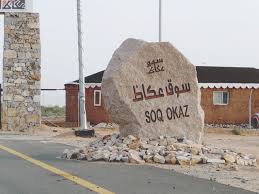Sunday Classics: Al Khansa, the ‘Greatest Among Those with Breasts’ (& Testicles, Too)
The final Sunday classic for Women in Translation Month (#WiTMonth) is the undisputed sovereign of the seventh-century elegy:
 Al-Khansāʾ — the use-name of Tumāḍir bint ʿAmr ibn al-Ḥārith ibn al-Sharīd (575 – ca. 644CE) — is one of the outsized names of Arabic poetry, best known for the poems she wrote from about 612 onward, lamentations for the deaths of her brothers Muʿāwiyah and Ṣakhr, who apparently died from injuries sustained in battle. She was famed in her lifetime for both her poetry and her self-regard, having rejected the marriage proposal of a powerful man. She believed in the power of her poetry, and is reputed to have appeared at the Souq ’Ukaz in Makkah for the poetry contests.
Al-Khansāʾ — the use-name of Tumāḍir bint ʿAmr ibn al-Ḥārith ibn al-Sharīd (575 – ca. 644CE) — is one of the outsized names of Arabic poetry, best known for the poems she wrote from about 612 onward, lamentations for the deaths of her brothers Muʿāwiyah and Ṣakhr, who apparently died from injuries sustained in battle. She was famed in her lifetime for both her poetry and her self-regard, having rejected the marriage proposal of a powerful man. She believed in the power of her poetry, and is reputed to have appeared at the Souq ’Ukaz in Makkah for the poetry contests.
According to later reports, she converted to Islam when she was in her mid-50s. Her sons fought at the battle of al-Qadisiyyah, at which, legend has it, she was present.
A story oft-repeated is that the poet Al-Nābighah al-Dhubyānī told Al-Khansāʾ she was “the greatest poet amongst those with breasts,” to which she apparently shot back: “I am the greatest poet amongst those with testicles, too.” (Translation from Arab Women Writers: A Critical Reference Guide 1873‐1999.)
Al-Khansa’s elegies were later collected by Ibn al-Sikkit (802–858 CE), a literary scholar of the early Abbasid era.
Emily Drumsta, who talked with ArabLit about her course “Women’s Writing in the Arab World,” said, “It’s impossible to talk about elegy without starting with al-Khansa’, and [Geert Jan] Van Gelder’s translation of her most famous poem (for her brother Sakhr) is really quite good. Unfortunately, there aren’t very many poetic translations of other prominent premodern women elegists[.]”
Van Gelder’s translation, in Classical Arabic Literature: A Library of Arabic Literature Anthology, opens:
 James Montgomery’s writes about how he finally connected with the poems of al-Khansa in the chapbook Loss Sings, reviewed by Sarah Irving for ArabLit, who writes:
James Montgomery’s writes about how he finally connected with the poems of al-Khansa in the chapbook Loss Sings, reviewed by Sarah Irving for ArabLit, who writes:
Al-Khansāʾ’s poetry is a staple in anthologies of classical Arabic literature, and as such has been exposed to English-language readerships according to changing styles and tastes in poetry. As such, many of the versions available are florid, lachrymose and wordy. Not so for Montgomery’s contributions, which are clean, spare, often simple in the choice of words:
Night is long, denies sleep.
I am crippled
by the news –
Ibn ‘Amr is dead.
The effect is one laden with impact; the depth of Al-Khansāʾ’s pain and the sense of an unrelenting onward force which strips away her strength and vitality is palpable. There could be little more inexorable the closing line of:
Then Time came,
and harvested its malice.
Time never fails.
It is no easy thing to translate art that not only spoke in a different language, but also sat in a markedly different artistic, associational, and emotional context. Montgomery speaks beautifully to that challenge in Loss Sings. Yet the thing that translates so easily about al-Khansa is her self-belief. It is quite easy for any of us in 2020 to imagine a woman poet being praised in such a meager way, “Not bad for someone with boobs.” And responding with a sharp-tongued jab at a man’s nether regions.
More:
‘Loss Sings’ and the Relevance of Poetry from Nearly a Millennium and a Half Ago
Bulaq 23: ‘Poems That Cross Language and Time’
The National: Book review: Personal grief in ‘Loss Sings’ offers a new perspective on classical Arab poet
